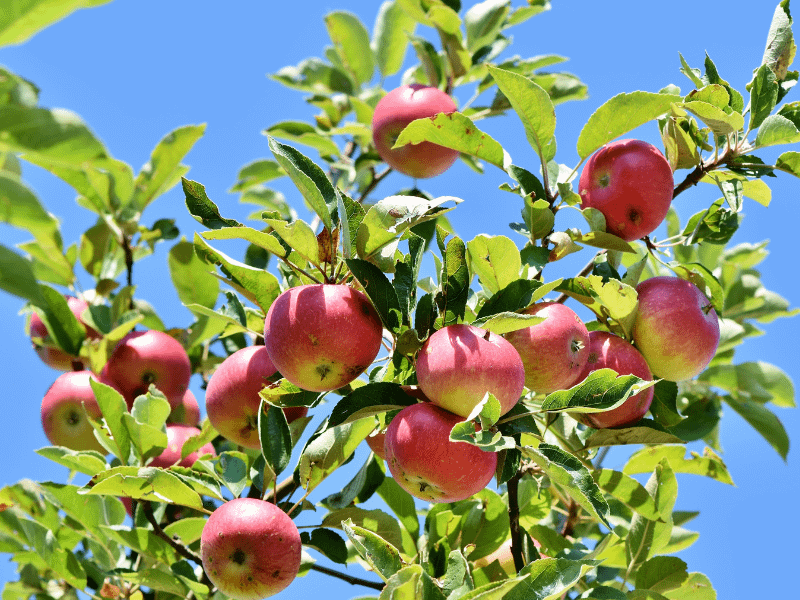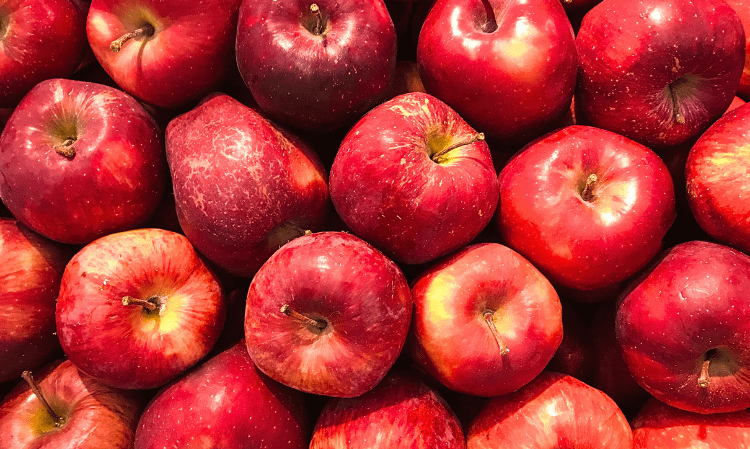Share This


Pages on this site may contain affiliate links, meaning if you book or buy something, I may earn an affiliate commission at no additional cost to you. Thank you for your support! Learn More
Also note: While I am a certified nutrition coach, I am not a medical doctor. Information here is not intended to be a replacement for the advice you should seek from your doctor.
Sweet, juicy, and crunchy: everybody loves apples! 🍎🍏 But is the old saying “an apple a day keeps the doctor away” true? And what are the main health benefits of eating apples? Let’s discover everything in this article!
An Apple a Day Keeps the Doctor Away: all the health benefits of eating apples!
Although there is no actual research showing that eating at least one apple a day may be associated with fewer visits to the doctor, the health benefits of eating apples can be quite remarkable. Here are the main ones.
1. Improved heart conditions
Apples are associated with a reduced risk of heart disease. The merit goes to the soluble fiber contained in them, which has proven to be particularly effective in reducing blood cholesterol levels and in managing blood pressure.
Moreover, apples are rich in polyphenols, such as epicatechin, which have been linked with lower blood pressure levels and a lower chance of suffering from strokes and other coronary conditions.
Last but not least, the flavonoids contained in apples can help prevent heart disease by lowering blood pressure, decreasing LDL cholesterol oxidation, and preventing atherosclerosis (i.e. the buildup of plaque in the arteries).
2. The antioxidant and anti-inflammatory properties
Among the benefits of eating apples are also their antioxidant and anti-inflammatory properties. Indeed, apples are rich in vitamin C, also known as ascorbic acid. This is a powerful natural antioxidant, essential in preventing the formation of free radicals.
In addition, the Vitamin C contained in apples is necessary for boosting immune function, which can help defend the body from external infections and viruses.
In order to be able to reap all these benefits, it is recommended to eat the skin of apples, as it contains the highest concentration of vitamin C within the fruit.
❤️❤️ Don’t miss a recipe or post! Make sure you remember to sign up for my Newsletter and follow me on social ❤️❤️!
Get Your Free Stuff!
3. A great help in preventing the risk of type-2 diabetes
Apples can be a great tool in reducing the risk of type-2 diabetes. This beneficial effect is due to the high content of antioxidant polyphenols, mainly quercetin and phloridzin.
The anti-inflammatory effects of quercetin can reduce insulin resistance, which is one of the most important risk factors for diabetes. At the same time, phloridzin reduces the absorption of sugar in the small intestines, contributing to a lower blood sugar load and thus a reduced risk of suffering from diabetes.
4. Protect your skin and hair with apples
The benefits of eating apples also include an improvement in the condition of our skin and nails. Indeed, the vitamin C contained in this fruit can boost the production of elastin and collagen. In turn, collagen is essential in maintaining and improving skin tone, speeding up the natural production of skin cells, and strengthening nails and hair.
Similarly, the group B vitamins contained in apples – mainly riboflavin, thiamin, and vitamin B-6 – can aid in soothing skin irritation and help fight acne. In particular, thiamine is good for red, irritated, acne-prone, or dry skin. It also improves the appearance of fine lines and wrinkles. On the other hand, riboflavin can help improve skin tone, make skin more radiant, and balance natural oils.
5. Improved gut microbiome diversity and easier weight loss among the benefits of eating apples
Apples contain pectin, a special type of fiber that acts as a probiotic. Probiotics feed intestinal microflora, the good bacteria in our intestines. In turn, a healthy intestinal microflora plays an essential role in promoting better physical and mental health conditions.
Moreover, apples have been proven particularly helpful for people following a weight loss diet. Indeed, as said before, apples are rich in fiber. This is useful in promoting feelings of fullness, thus helping decrease calorie intake – one of the main driving factors of weight loss.
The Nutrition Facts of Apples: low in calories but rich in nutrients
Apples are rich in fiber, calcium, magnesium, vitamin C, and folate while being quite low in calories and sugars (with Granny smith being the lowest and Fuji the highest). This makes them easy to insert into any dietary regime.
One medium 7-ounce (200-grams) apple offers the following nutrients:
- Calories: 104
- Carbs: 28 grams
- Fiber: 5 grams (11-14% of DV)
- Vitamin C: 10% of the Daily Value (DV)
- Copper: 6% of the DV
- Potassium: 5% of the DV
- Vitamin K: 4% of the DV
- Calcium 12 mg
- Magnesium 10 mg
- Folate 6 mg
- Iron 0.24 mg
Fun Facts About Apples
- Apple is also known as the “queen of fruits”, “forbidden fruit”, and “fruit of knowledge”. In some mythologies, it is even described as a fruit that provides eternal youth.
- Domestic, cultivated apples belong to the rose family.
- Today, there are more than 10,000 different varieties of apples, which differ in juiciness, consistency, acidity, sweetness, taste, and color. However, they all have similar nutritional values and health properties.
- Apple seeds contain cyanide. This is a toxic compound that, if eaten in excess, can lead to heart and brain damage, and ultimately coma and death.
- In Chinese culture, it is a popular gift when visiting someone for the first time.
- Isaac Newton discovered the law of gravity thanks to an apple. Newton was resting under an apple tree when one fell on his head. This helped him understand how gravity works.
Some Tips on How to Choose the Best Apples
The perfect apple fruit is compact and firm to the touch and has regular and undamaged skin. On the other hand, avoid fruits that are soft to the touch, as they might have been put in the refrigerator and then thawed.
Also try to buy organically-grown apples, as you might want to eat the skin to reap all the benefits of this amazing fruit, and in this way, you can avoid consuming pesticides.
The Cultivation of Apples
Apples like rich, moist, well-drained, and loamy soils. On the other hand, they do not tolerate soils with a high level of groundwater or places where apples were previously grown.


Apples, like pears, should be well irrigated during the fruit development phase. However, excessive irrigation might cause the roots to rot, making it harder to have high-quality fruits. The depth of the soil that needs to be moistened depends thus on the stage of plant development, the variety, and the depth of the roots.
In particular, sandy soils require less irrigation than clay soils. Similarly, lighter soils need to be irrigated more often because trees need water equally regardless of the type of soil they are grown on. In addition, apple trees need the most water from the end of flowering to the end of fruit development.
Apples in the Kitchen: my best salty and sweet recipes!
Apples are a very versatile ingredient, great in both salty and sweet recipes.
In addition, they can be used either in their “raw” form or pureèd as apple sauce. This latter is particularly optimal for the preparation of cakes and pancakes, as it can help to give more moisture and softness to the batter. For example, I used apple sauce in these Spelt Waffles and Beet and Date Carrot Cake.
I personally love to use apples in my breakfasts, as they help me to start the day on the right foot! Among my favorite breakfast recipes are these Apple Cinnamon Oatmeal, Strawberry Rhubarb Baked Oats, Baked Oatmeal with Apples and Cranberries, Apple Cinnamon Overnight Oat Parfait, Apple Pie Oatmeal Cookies, and Apple Cinnamon Yogurt. I also love this Apple Crisp Macchiato Syrup for an alternative Fall beverage!


Apples are great in salty dishes as well! For example, they give a crispy and juicy touch to salads, like my Kale Apple Beer Coleslaw and Winter Harvest Salad.

























